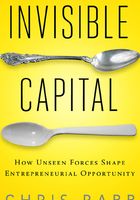
Why Invisible Capital Matters to All of Us
Good people with great vision, tenacity, and ingenuity can start businesses that never get off the ground. Millions, in fact. (I like to think that I’ve been among this large contingent once or twice.)
Too often, we see entrepreneurial stumblings as a sign of personal failings rather than the logical result of a lack of the right mix of resources (and a dose of good timing). Such resources are encapsulated in part by invisible capital, which takes into account those things that correlate to the increased preparedness and openness to opportunity that many believe are the key ingredients in luck. Without understanding which tacit assets a particular business requires, would-be entrepreneurs are bound to fail. The high price for this ignorance is paid not only by entrepreneurs themselves, but also by the households and communities that depend on those businesses’ survival. More broadly, America as a whole suffers when each successive generation of entrepreneurs enters this maze without understanding the invisible barriers to their chances of long-term survival.
Understanding the role of invisible capital will enable more Americans to create new business ventures; build wealth; create more jobs; innovate new products, services, technologies, business methods, and processes; increase the tax base; and, ideally, bolster communities—from historic neighborhoods to new digital constituencies.
Invisibility masks and protects certain advantages that should not remain whether or not we know they exist. The conscious act of democratizing entrepreneurial opportunity will help dissolve these disparities, aid those at a disadvantage to flourish, and strengthen the social fabric of our society.